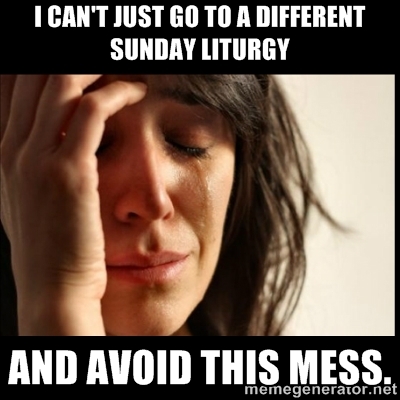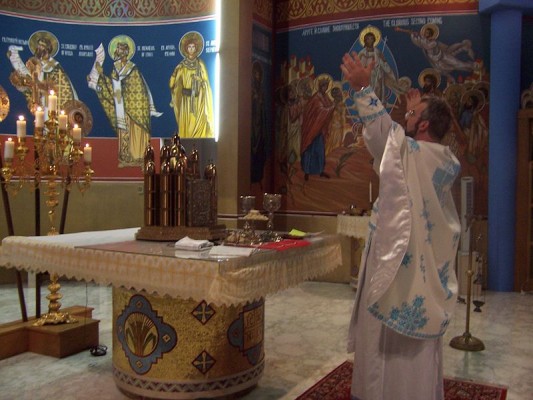This is a series dedicated to the Roman Catholic who finds him or herself curious about becoming a Byzantine Catholic. In part one of this series, I recommended a great book and a few other things to get you started.
In this post, I’d like to discuss some of the misconceptions I’ve known in my few years as a practicing Byzantine. They’re not the kind of misconceptions you’ll read about in theology books, but have more to do with how people tend to approach Byzantine communities.
Jumping right in, then...
1) “Byzantine congregations are so small. You must have an awesome community!”
Don’t mistake knowing everyone’s name for being solid community. Small congregations tend to have just as many disadvantages (and advantages) to building a peaceful, compassionate, and motivated church community as do larger ones.
For example, yes, having a small parish affords more personal time with your priest and fellow parishioners, which has great ministerial advantages. However, in such close quarters, drama tends to grow quickly. If people have a difficult encounter with one another, they can’t just sit on opposite sides of a massive church or go to separate Sunday liturgies (in many cases) and avoid one another. They have to actually work through the issue or endure the impending drama.
The former option can yield beautiful results, but we imperfect humans often to choose the latter. Gossip and rumors also spread to a greater percentage of the community much faster simply because there is less ground to cover. This can, again, lead to unnecessary drama.
There's no need to divulge all the other possible pros and cons. Just know that we small congregations have stumbling blocks as much as any larger parish.
Why even mention this? I have seen people “decide to become Byzantine” based on the seemingly wonderful community they experience within their first few weeks at a church, only to find months later that we have problems just like anyone else. They eventually discover that what they really wanted all along was not Byzantium but a better community than what their old Roman parish was offering.
2) “I can be bi-ritual” or “I can practice both Byzantine and Roman Catholicism.”
It would appear that the underlying problem with this idea is a further misconception that Byzantine spirituality is merely cosmetically different from Roman spirituality. But, as I mentioned in part one, this could not be further from the truth.
The two spiritualities, while celebrating the same dogmatic and universally Catholic beliefs, approach those beliefs from two very different angles that are not compatible to be practiced all together by one person or mish-mashed into some kind of franken-spirituality. This is not only something I have come to learn by my own reasoning and experience but through consultation with an experienced spiritual director as well.
(“But what about bi-ritual priests?” Bi-ritual priests have been canonically given faculties to preside over liturgies in both rites. However, even these priests do not necessarily “practice” both spiritualities. Usually a priest has one spirituality that he practices personally, and he simply helps out in the other rite out of a real need. There are some rare clergy who attempt to practice both, but I feel like these men are the exception to the rule.)
As a die-hard, cradle Roman Catholic, I understand how troubling everything I am saying here can be for some people. The problem of not being able to be “bi-ritual” was troubling to me when I first encountered it, and committing to living one spirituality consistently hasn’t been easy: I have had my ideas of theology, Catholicism, and God himself shattered time and time again by learning Byzantine theology.
I have had to let go of my most treasured, uniquely-Roman practices--like Eucharistic adoration--in order to live a spiritual life that was consistent with the Byzantine spirituality to which I felt called. I have had to adjust to living a radically different church calendar. I have had to relearn how to pray.
My world has been broken time and time again by having to give up Roman Catholicism and give myself completely to this spirituality. But this breaking has been fruitful beyond my imagination.
If I could tell one thing to Romans who have discerned they are supposed to be Byzantine, it would be this: do not be afraid to give up everything that is uniquely Roman Catholic in your spirituality and to adopt Byzantine spirituality wholeheartedly.
It’s important to note that this does not mean as a Byzantine you can never attend Mass or Eucharistic adoration if the circumstances call for that (i.e weather prevents you from driving to your Byzantine church or a friend invites you to adoration with them). What it does mean is that, at the times when you would normally go to Mass, go to Divine Liturgy instead. When you would usually spend an hour in adoration, pray with an icon instead. When you would usually say the Rosary, pray the Akathist to the Theotokos. If you have a choice between a Byzantine or a Roman option, choose the Byzantine one. And so on.
Likewise, if you discern that you should continue to be Roman Catholic, give up your uniquely Byzantine practices and return to Roman spirituality completely.
A few people might find themselves in situations where they must encounter both spiritualities on a regular basis. One of the most common examples of this would be a “mixed” marriage, where one spouse is Byzantine, and the other is Roman. In order to fully support such situations, I think it can be beneficial to seek a solid spiritual director and possibly even a counselor.
3) “The Divine Liturgy is just so much more reverent” and “Byzantines are so much more aware of and/or faithful to the traditional teachings of the Catholic faith.”
 "Alright, naked baby cherubs, the Romans are coming over for dinner next week. They're no Byzantines, but they're part of our Church, so we have to tolerate them. Put out the IKEA china. I don't want to risk them breaking the expensive stuff." #thingstheHolySpiritneversaid
"Alright, naked baby cherubs, the Romans are coming over for dinner next week. They're no Byzantines, but they're part of our Church, so we have to tolerate them. Put out the IKEA china. I don't want to risk them breaking the expensive stuff." #thingstheHolySpiritneversaid
I lumped these two together because they both occur on a theme of “The Byzantine church is a holier place to be than the Roman church.” While many good jokes can be and have been made about this being the case--and I am not afraid to use them--nothing could be further from the truth. Otherwise, there would be no need for the Roman (or any other Catholic) church.
It’s not as though the Holy Spirit organized his churches into the “A team” and the “B team."
Addressing these two misconceptions specifically, I would say first of all that every rite approved by the Catholic Church is reverent. Period. If you perceive more reverence in a Divine Liturgy than at Mass, I would encourage you to dig deep and find out what’s really going on: is there something intrinsic to the Divine Liturgy itself that moves you? Or are you just excited about the way the priest celebrates the Liturgy or about the fact that it’s different from your normal routine?
To address the second misconception, no, just...no! We are a normal variety of sinners just like Rome. The misconception makes some sense, because one might assume that a person who is aware of something as obscure in the Catholic faith as the Byzantine church would also be aware of many of the more basic teachings. But, for a large number of reasons, that’s simply not the case.
4) "What’s cool about Byzantium is all the fun extra 'stuff' that they have: the incense, the bells, priests wearing blue, the extra blessings on feast days, etc."
Ugh. This misconception drives me nuts, even if those nuts happen to be blessed.
What’s cool about Byzantium is its rich spiritual tradition that goes far beyond extra blessings, fancy garments, speaking old Church Slovanik, or whatever other small things people tend to first notice and attach to in our churches.
Don’t get me wrong, those small things are great. But it's important to not get stuck on them and miss the bigger and more magnificent realities to which they are meant to point, such as the therapeutic quality of Byzantine spirituality, an approach to theology that both differs from and supplements the Roman approach to theology, a unique understanding of the makeup of the human person, illumination, theosis, and so much more.
Let's not forget the magnificent realities that the Byzantine church shares with the other Catholic churches, such as the Eucharist, priests who can celebrate the Mysteries and Sacraments, an appreciation for the role of Mary as our mother and intercessor, and that whole worship-of-the-one-true-God thing.
Whenever I see or hear people getting caught up in the more ornamental aspects of our faith, I can’t help but wonder what past and current martyrs have considered as they face their death: thank God their grapes got blessed at the Feast of the Transfiguration or thank God they got to participate in the Mystery of the Eucharist for that feast? Thank God they have a prayer rope or thank God they have prayer?
The fundamentals of this spirituality are absolutely beautiful, but it’s a beauty can’t be found by living merely on--or for--the bells and the incense and the blessed grapes and all the other relatively trivial stuff.
As far as discernment goes, I feel like committing to a spirituality based on its ornamental features is similar to committing to a spouse only for their physical appearance or their hobbies: by refusing to dig deeper, you miss out on some of the most amazing and fulfilling experiences.
5) "If I discern that I am not called to the Byzantine church, I have failed or I didn’t 'make it.'”
This is closely connected to number 3 and that whole “A team, B team” mentality.
If you discern that you truly aren’t called to become a saint through Eastern spirituality, that means you’re called to become a saint through Western spirituality. You have in no way failed. In fact, coming to a proper discernment means you’ve succeeded incredibly.
Most of you know this and read it and say it and agree. But I fear there are a few people who, despite knowing all this, attach themselves at the beginning of discernment to becoming Byzantine as though it were somehow holier than the other options.
The Byzantine church's minority status often gets mistaken for exclusivity, a kind of club in which only the extra cool kids are invited. Again, nothing could be further from the truth. Roman Catholicism is beautiful, and the world needs Roman and Byzantine saints who exude authenticity and humility, not Roman and Byzantine Catholics trying to maintain an image or to distinguish themselves. If you discern you are meant to be a Roman Catholic, praise God for the journey you’ve taken and for it’s beautiful end.
Finally:
I hope and pray that sharing some of these lesser discussed points is helpful for your discernment and that I haven't scared you away with my moments of snark. I also hope and pray that your spiritual journey is peaceful and fruitful, wherever it happens to take you.
If you have any questions, as always, please feel free to mention them in the comment section.
Copyright Brittany Balke, 2014
About the Author

Guest
We welcome guest contributors who graciously volunteer their writing for our readers. Please support our guest writers by visiting their sites, purchasing their work, and leaving comments to thank them for sharing their gifts here on CatholicMom.com. To inquire about serving as a guest contributor, contact editor@CatholicMom.com.




.png?width=1806&height=731&name=CatholicMom_hcfm_logo1_pos_871c_2728c%20(002).png)
Comments